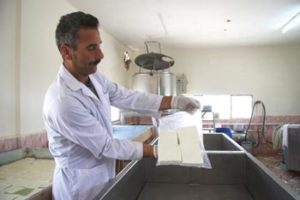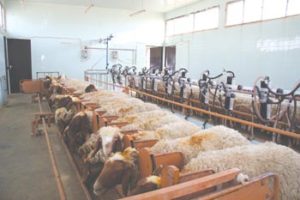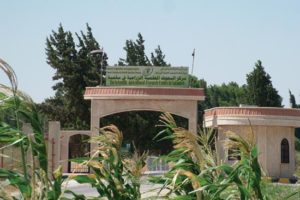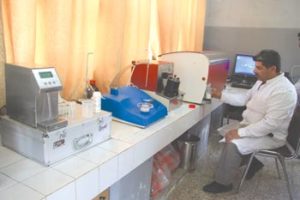Marj-Al-Kareim Research Station
Site and climate:
It is located in the western side of the Syrian steppe, about 25 km away from the east of Hama city. Its total area is around 213 ha. Its climate is hot and dry in summer and cold and rainy in winter. The station is technically run in cooperation between the General Commission for Scientific Agricultural Research (GCSAR) and the Arab Center for the Studies of Arid Zones and Dry Lands (ACSAD). A project on “Improving Awassi Sheep by Selection Process” is implemented currently in this station.
Objective:
Improve the productive and reproductive efficiency of Awassi sheep and produce genetically-improved animals to be distributed among research stations in Arab countries and breeders.
Infrastructure:
- Several flocks of Awassi sheep.
- A reproduction and artificial insemination laboratory which is well-supplied with all the necessary equipment and supplies for semen collection and manipulation processes.

- A feeding laboratory in which fodders are analyzed and feeding mixes, that suit the different physiological stages of sheep flock, are formed.
- Units for animal health, dairy processing and integrated nutritious pressed fodders making. These units are well supplied with the most modern necessary supplies, equipment and tools.
- A unit for biogas production and clean organic fertilizer processing.
- A sheep milking parlour with a capacity of 48 heads at a time.
- All machinery, equipment and supplies necessary for activities implementation.
- Administrative buildings and a typical training center for 20 trainees. The center is supplied with all the necessary audio and visual means and provides a good accommodation.
Activities:
- Select each productive trait apart from the other within one flock.
- A milk production line, a meat production line and a dual- purpose production line.

- Select improved flocks at stations with different climatic conditions.
- Distribute improved animals among Arab countries and breeders.
- Produce improved flocks for all productive traits (dual purpose flocks).
- Train, rehabilitate and increase the scientific and technical knowledge of the human resources in the field of sheep breeding and improvement.






